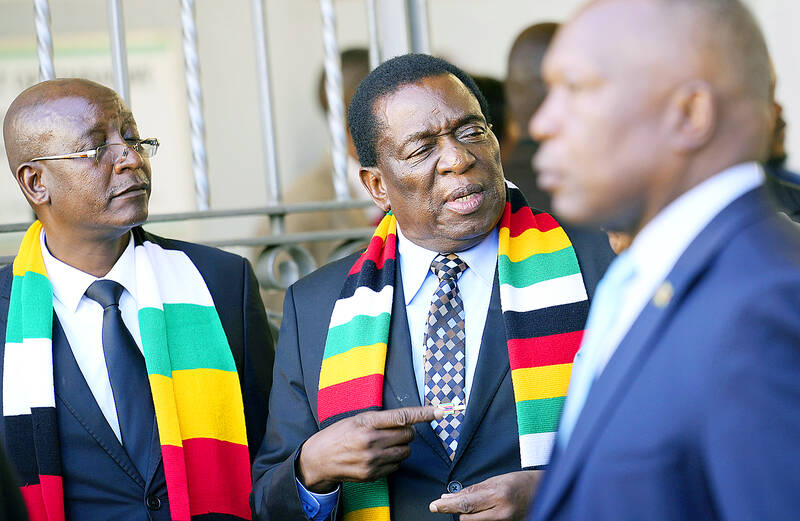Eleven candidates are to run for the Zimbabwean presidency in an election in August, the Zimbabwe Electoral Commission said, after several hopefuls were disqualified for failing to raise the US$20,000 needed to appear on the ballot.
The election is expected to pit Zimbabwean President Emmerson Mnangagwa, of the Zimbabwe African National Union — Patriotic Front (ZANU-PF) party, against pastor and lawyer Nelson Chamisa of the Citizens Coalition for Change party, who is seen as the strongest challenger.
The commission on Thursday said that 11 candidates had been disqualified from the election, several of whom, including human rights advocate Linda Masarira, failed to pay the US$20,000 to secure a slot on the ballot by Wednesday, dashing hopes of a female candidate for the top office.

Photo: AP
“I have been clear that the US$20,000 is exorbitant, it is discriminatory in nature and violates the section that speaks to non-discrimination in the eyes of the law,” Masarira said.
While Mnangagwa and Chamisa remain top contenders to revive the southern African country’s waning economic fortunes, an independent candidate for president has emerged in recent weeks.
Self-exiled independent candidate Saviour Kasukuwere, a former minister in then-Zimbabwean president Robert Mugabe’s Cabinet, is expected to attract votes in ZANU-PF strongholds.
Kasukuwere, who fled the country during a coup that deposed Mugabe, has harbored presidential ambitions before.
Mnangagwa, 80, is seeking another term amid an economic collapse, with the Zimbabwe dollar plunging more than 50 percent this month against the US dollar.

The collapse of the Swiss Birch glacier serves as a chilling warning of the escalating dangers faced by communities worldwide living under the shadow of fragile ice, particularly in Asia, experts said. Footage of the collapse on Wednesday showed a huge cloud of ice and rubble hurtling down the mountainside into the hamlet of Blatten. Swiss Development Cooperation disaster risk reduction adviser Ali Neumann said that while the role of climate change in the case of Blatten “still needs to be investigated,” the wider impacts were clear on the cryosphere — the part of the world covered by frozen water. “Climate change and

Poland is set to hold a presidential runoff election today between two candidates offering starkly different visions for the country’s future. The winner would succeed Polish President Andrzej Duda, a conservative who is finishing his second and final term. The outcome would determine whether Poland embraces a nationalist populist trajectory or pivots more fully toward liberal, pro-European policies. An exit poll by Ipsos would be released when polls close today at 9pm local time, with a margin of error of plus or minus 2 percentage points. Final results are expected tomorrow. Whoever wins can be expected to either help or hinder the

DENIAL: Musk said that the ‘New York Times was lying their ass off,’ after it reported he used so much drugs that he developed bladder problems Elon Musk on Saturday denied a report that he used ketamine and other drugs extensively last year on the US presidential campaign trail. The New York Times on Friday reported that the billionaire adviser to US President Donald Trump used so much ketamine, a powerful anesthetic, that he developed bladder problems. The newspaper said the world’s richest person also took ecstasy and mushrooms, and traveled with a pill box last year, adding that it was not known whether Musk also took drugs while heading the so-called US Department of Government Efficiency (DOGE) after Trump took power in January. In a

It turns out that looming collision between our Milky Way and Andromeda galaxies might not happen after all. Astronomers on Monday said that the probability of the two spiral galaxies colliding is less than previously thought, with a 50-50 chance within the next 10 billion years. That is essentially a coin flip, but still better odds than previous estimates and farther out in time. “As it stands, proclamations of the impending demise of our galaxy seem greatly exaggerated,” the Finnish-led team wrote in a study appearing in Nature Astronomy. While good news for the Milky Way galaxy, the latest forecast might be moot